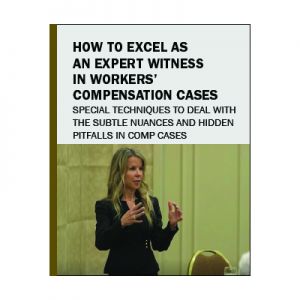How Citing Literature Can Bolster Your Expert Witness Opinion in a Workers’ Compensation Case
Excerpted from the SEAK’s Course: How to Excel as an Expert Witness in Workers’ Compensation Cases: Special Techniques 
– So we’re on page three now. Does the physician have a scientific basis for his opinion on causation? Okay. What we teach in the IMB course, and I’ll mention here too is that there are two kinds of reports and two kinds of testimony basically. One is I’m an orthopaedic surgeon. I know a lot about orthopaedic surgery. I’ve treated thousand of patients. I’ve examined this person and my opinion, his alleged accident from lifting that box is not causal relate to his back condition. Okay. Technically, it’s legally sufficient but it’s very bare. Okay. It’s, like, take my word for it. I know that I’m doing. Then you get a better much different opinion is, I’m an orthopaedic surgeon. Okay. And based upon the following, this person, get into more resuscitation effects, and then citing some literature. Okay. And we’ll talk about citing literature. In my opinion, Judge can comment on this, the good lawyers and the good doctors now in worker’s compensation cases are citing literature research studies, especially in important cases. That takes you from, I’m a doctor, believe me, to I’m a doctor, but here’s my research. Here’s what I [inaudible]. And there’s all kinds of issues that have been researched, whether or not if somebody has a problem with his leg left and he leans on his right leg too much, is that going to cause a problem in his right leg. There’s research on that, okay? So you can either say, “The other leg is not related to his left leg,” or you can say, “The other leg is not related to his left leg, based upon these studies,’ and cite some studies that say that. Okay. Now the judge has to weigh the doctors. Well, which way you think the judge is going to go, all things being equal? And we’ll talk about that, and this is the way you can move the needle in these cases, become more persuasive. And you know, in terms of your opinion. I think these become important, very important points, because the judge faced all day long with the two different dualing doctors. He is disabled. He’s not disabled. It is related. It isn’t related. Okay. And the judge wasn’t there. Neither was anybody else actually. Okay. And so now, they have to weigh all the evidence and one person says it’s not related, trust me. And another person says it’s not related, based upon the following and he gives some research or whatever. It doesn’t have to be, you know, a 25 pound treatises. Might be just one or two studies which are indicative. And very often in my view, that’s connecting the dots and that can move the needle. And again, you’re not trying to win the case. You’re just trying to be more persuasive based upon your opinion, which we believe.
– Can I just support this point too? I think citing medical journals is very helpful, and we as judges are not supposed to Google things. So if you cite something or say something, I’m not supposed to look at Google and say, “Is this really what the literature the science says?” I’m not supposed to do that. So if you’re going to rely on an article, I would encourage you to actually attach it to your report. That’s the only way I’m going to see it, is if it’s actually attached to the report as well. And I do think it’s key. Infusions, I see a lot of doctors saying, and I think rightfully so, “This person shouldn’t undergo this three level fusion because he’s a heavy smoker and he’s not going to heal.” Okay. But cite the literature or the science that you have to support your opinion, cite it and attach it to your opinion, because I also have treating physicians that are on the other side saying, “That doesn’t matter. It doesn’t matter.” And when the only question for me is the reasonableness and necessity of the surgery, meaning everybody’s saying it’s causally related to the work injury, it’s just whether the employee undergoes it or not? I mean, that’s crucial. Like, Steve said, just saying that it is what it is, isn’t really helpful for me. Express to me or explain to me and cite your research as to why this surgery is going to fail because the employee won’t stop smoking.
